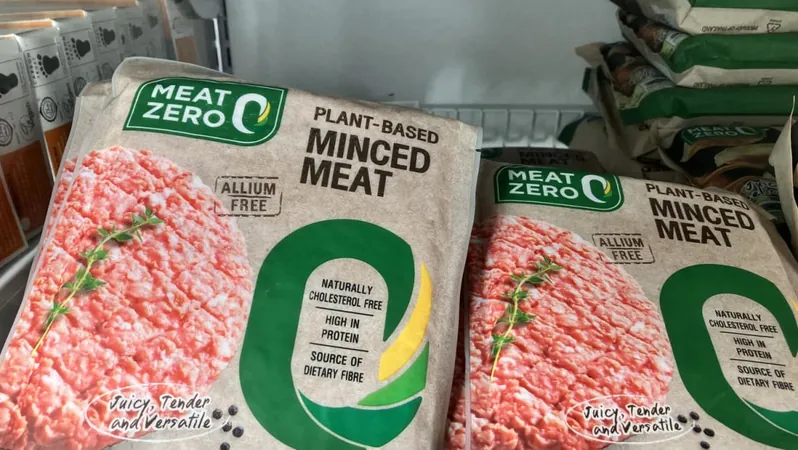
The Truth About Plant-Based Meat: Is It Really Healthy?
2024-09-21
SINGAPORE
The landscape of grocery shopping has dramatically transformed over the past decade, with plant-based meat products now claiming significant shelf space in supermarkets. As more consumers explore these meat-less alternatives, ingredients like meatballs, dumplings, and burger fillings made from plants have gained popularity in both home-cooked meals and restaurant menus.
In a groundbreaking move in 2020, Singapore became the first country to authorize the commercial sale of lab-grown protein, also known as cultivated or cultured "meat." This pioneering step has paved the way for a multitude of startups seeking to capitalize on the rising demand for animal-free proteins and fermentation-based alternatives.
The surge in demand for plant-based options can be attributed not only to health and ethical considerations but also to increasing awareness of environmental issues related to meat production. The meat industry, particularly beef processing, is a leading contributor to greenhouse gas emissions, making meat substitutes an appealing option for those aiming to reduce their carbon footprint.
However, as more companies enter this growing market, it’s vital to scrutinize the nutritional value of these products. Not all plant-based meat substitutes are created equal, and some brands may prioritize profit over quality.
Experts including dietitians, food scientists, and endocrinologists have weighed in on the ingredients that constitute these alternatives and the implications for health.
Why the Interest in Plant-Based Meat?
According to Ms. Shanice Lim, a dietitian at Ng Teng Fong General Hospital, the rising interest in meat-free products stems from varied tastes and dietary restrictions rooted in either ethical beliefs or religious practices. Additionally, concerns over food security and sustainability have propelled the demand for innovations in this sector. Singapore aims to produce 30% of its nutritional needs domestically by 2030, which has led to active government investment in the alternative protein field.
Research by Associate Professor Du Juan from the Singapore Institute of Technology indicated that curiosity about health and sustainable eating habits are major driving factors behind the popularity of these products among younger demographics.
Is Plant-Based Meat Safe to Eat?
The production of plant-based meat products is regulated under stringent safety protocols, ensuring adherence to health standards. They are subject to Hazard Analysis & Critical Control Point (HACCP) practices, which focus on food safety through identifying critical processing conditions.
What Ingredients Are Commonly Used?
Plant-based meats are designed to mimic the flavor and texture of traditional meat. Common protein sources include soy, pea, and wheat protein, while innovations have incorporated microbial sources such as algae and even potato protein. While soy-based options are high in protein and provide essential nutrients, pea protein is gaining traction for being lower in calories and fat. Wheat gluten, while rich in protein, falls short on nutritional diversity.
Yet, with these products typically being highly processed, they can include unhealthy additives like hydrogenated oils and excessive sodium levels. Traditional plant proteins like legumes, on the other hand, are nutrient-dense and minimally processed.
Potential Risks of Plant-Based Meats
1. **Processing Concerns**: Many plant-based meat products undergo extensive processing, which may strip away nutrients or introduce unhealthy additives.
2. **Nutritional Shortfalls**: Key nutrients like Vitamin B12, iron, and zinc are often less bioavailable in plant-based meats. Vitamin B12 needs to be fortified since it's typically absent in these products.
3. **Allergens**: Common allergens, including soy and gluten, render many plant-based options unsuitable for allergy sufferers.
The Upsides of Plant-Based Meat
1. **Heart Health**: Generally lower in saturated fats, plant-based meats may positively influence cholesterol levels and lower heart disease risks.
2. **Protein Source**: They provide ample protein without the cholesterol found in animal products, appealing to vegans and vegetarians.
3. **Weight Management**: Lower-calorie variants can assist those monitoring their caloric intake while high fiber content promotes better digestion and satiety.
While including plant-based meats in a diet can offer health benefits, moderation is essential, as not all products are created equal. Consumers should examine nutritional labels for sodium, saturated fat, and added sugars to avoid potential health pitfalls.
Expert Advice and Innovations on the Horizon
Nutritionists recommend incorporating plant-based meats in moderation, complementing them with whole, minimally processed foods like beans and vegetables. Innovative companies are creating meat analogues such as Tindle, which offers an array of plant-based chicken products.
The Singapore Institute of Technology is also exploring enhanced processing techniques for plant-based proteins, emphasizing quality over mere taste. Future advancements in this sector may lead the way for healthier, more appealing products that cater to diverse consumer needs.
As the market evolves, consumers are encouraged to remain vigilant about understanding what is in their food and making informed dietary choices, balancing the benefits of plant-based meats with the potential risks.




 Brasil (PT)
Brasil (PT)
 Canada (EN)
Canada (EN)
 Chile (ES)
Chile (ES)
 España (ES)
España (ES)
 France (FR)
France (FR)
 Hong Kong (EN)
Hong Kong (EN)
 Italia (IT)
Italia (IT)
 日本 (JA)
日本 (JA)
 Magyarország (HU)
Magyarország (HU)
 Norge (NO)
Norge (NO)
 Polska (PL)
Polska (PL)
 Schweiz (DE)
Schweiz (DE)
 Singapore (EN)
Singapore (EN)
 Sverige (SV)
Sverige (SV)
 Suomi (FI)
Suomi (FI)
 Türkiye (TR)
Türkiye (TR)